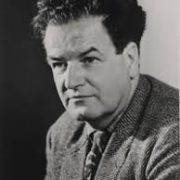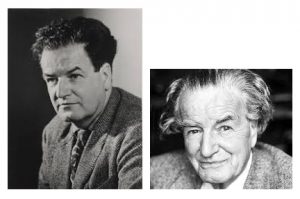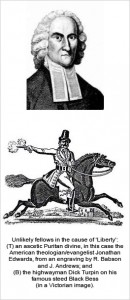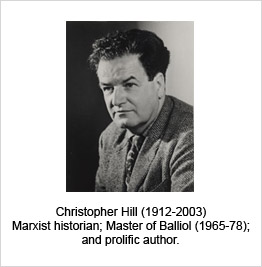MONTHLY BLOG 101, ARE YOU A LUMPER OR SPLITTER? HOW WELL DO YOU KNOW YOUR OWN CAST OF MIND?
If citing, please kindly acknowledge copyright © Penelope J. Corfield (2019)
The terminology, derived from Charles Darwin,1 is hardly elegant. Yet it highlights rival polarities in the intellectual cast of mind. ‘Lumpers’ seek to assemble fragments of knowledge into one big picture, while ‘splitters’ see instead complication upon complications. An earlier permutation of that dichotomy was popularised by Isaiah Berlin. In The Hedgehog and the Fox (1953), he distinguished between brainy foxes, who know many things, and intellectual hedgehogs, who apparently know one big thing.2

| Fox from © Clipart 2019; Hedgehog from © GetDrawings.com (2019) |
These animalian embodiments of modes of thought are derived from a fragmentary dictum from the classical Greek poet Archilochus; and they remain more fanciful than convincing. It’s not self-evident that a hedgehog’s mentality is really so overwhelmingly single-minded.3 Nor is it clear that the reverse syndrome applies particularly to foxes, which have a reputation for craft and guile.4 To make his point with reference to human thinkers, Berlin instanced the Russian novelist Leo Tolstoy as a classic ‘hedgehog’. Really? The small and prickly hedgehog hardly seems a good proxy for a grandly sweeping thinker like Tolstoy.
Those objections to Berlin’s categories, incidentally, are good examples of hostile ‘splitting’. They quibble and contradict. Sweeping generalisations are rejected. Such objections recall a dictum in a Poul Anderson sci-fi novella, when one character states gravely that: ‘I have yet to see any problem, which, when you looked at it in the right way, did not become still more complicated’.5
Arguments between aggregators/generalisers and disaggregators/sceptics, which occur in many subjects, have been particularly high-profile among historians. The lumping/splitting dichotomy was recycled in 1975 by the American J.H. Hexter.6 He accused the Marxist Christopher Hill not only of ‘lumping’ but, even worse, of deploying historical evidence selectively, to bolster a partisan interpretation. Hill replied relatively tersely.7 He rejected the charge that he did not play fair with the sources. But he proudly accepted that, through his research, he sought to find and explain meanings in history. The polarities of lumping/splitting were plain for all to see.
Historical ‘lumpers’ argue that all analysis depends upon some degree of sorting/processing/generalising, applied to disparate information. Merely itemising date after date, or fact after fact ad infinitum, would not tell anyone anything. On those dreadful occasions when lecturers do actually proceed by listing minute details one by one (for example, going through events year by year), the audience’s frustration very quickly becomes apparent.
So ‘lumpers’ like big broad interpretations. And they tend to write big bold studies, with clear long-term trends. Karl Marx’s panoramic brief survey of world history in nine pages in The Communist Manifesto was a classic piece of ‘lumping’.8 In the twentieth century, the British Marxist historian E.P. Thompson was another ‘lumper’ who sought the big picture, although he could be a combative ‘splitter’ about the faults of others.9
‘Splitters’ conversely point out that, if there were big broad-brush interpretations that were reliably apparent, they would have been discovered and accepted by now. However, the continual debates between historians in every generation indicate that grand generalisations are continually being attacked. The progression of the subject relies upon a healthy dose of disaggregation alongside aggregation. ‘Splitters’ therefore produce accounts of rich detail, complications, diversities, propounding singular rather than universal meanings, and stressing contingency over grand trends.
Sometimes critics of historical generalisations are too angry and acerbic. They can thus appear too negative and destructive. However, one of the twentieth-century historians’ most impressive splitters was socially a witty and genial man. Intellectually, however, F.J. ‘Jack’ Fisher was widely feared for his razor-sharp and trenchant demolitions of any given historical analysis. Indeed, his super-critical cast of mind had the effect of limiting his own written output to a handful of brilliant interpretative essays rather than a ‘big book’.10 (Fisher was my research supervisor. His most caustic remark to me came after reading a draft chapter: ‘There is nothing wrong with this, other than a female desire to tell all and an Oxbridge desire to tell it chronologically.’ Ouch! Fisher was not anti-woman, although he was critical of Oxbridge where I’d taken my first degree. But he used this formulation to grab my attention – and it certainly did).
Among research historians today, the temperamental/intellectual cast of mind often inclines them to ‘splitting’, partly because there are many simplistic generalisations about history in public circulation which call out for contradiction or complication. Of course, the precise distribution around the norm remains unknown. These days, I would guestimate that the profession would divide into roughly 45% ‘lumpers’, seeking big grand overviews, and 55% ‘splitters’, stressing detail, diversity, contingency. The classification, however, does depend partly on the occasion and type of output, since single-person expositions on TV and radio encourage generalisations, while round-tables and panels thrive on disagreement where splitters can come into their own.
Moreover, there are not only personal variations, depending upon circumstance, but also major oscillations in intellectual fashions within the discipline. In the later twentieth century, for example, there was a growing, though not universal, suspicion of so-called Grand Narratives (big through-time interpretations).11 The high tide of the sceptical trend known as ‘revisionism’ challenged many old generalisations and easy assumptions. Revisionists did not constitute one single school of thought. Many did favour conservative interpretations of history, but, as remains apparent today, there was and is more than one form of conservatism. That said, revisionists were generally agreed in rejecting both left-wing Marxist conflict models of revolutionary change via class struggles and liberal Whiggish linear models of evolving Progress via spreading education, constitutional rights and so forth.12
Yet the alignments were never simple (a splitterish comment from myself). Thus J.H. Hexter was a ‘splitter’ when confronting Marxists like Hill. But he was a ‘lumper’ when propounding his own Whig view of history as a process of evolving Freedom. So Hexter’s later strictures on revisionism were as fierce as was his earlier critique of Hill.13
Ideally, most research historians probably seek to find a judicious balance between ‘lumping’/‘splitting’. There is scope both for generalisations and for qualifications. After all, there is diversity within the human experience and within the cosmos. Yet there are also common themes, deep patterns, and detectable trends.
Ultimately, however, the dichotomous choice between either ‘lumping’ or ‘splitting’ is a completely false option, when pursued to its limits. Human thought, in all the disciplines, depends upon a continuous process of building/qualifying/pulling down/rebuilding/requalifying/ and so on, endlessly. With both detailed qualifications and with generalisations. An analysis built upon And+And+And+And+And would become too airy and generalised to have realistic meaning. Just as a formulation based upon But+But+But+But+But would keep negating its own negations. So, yes. Individually, it’s worth thinking about one’s own cast of mind and intellectual inclinations. (I personally enjoy both lumping and splitting, including criticising various outworn terminologies for historical periodisation).14 Furthermore, self-knowledge allows personal scope to make auto-adjustments, if deemed desirable. And then, better still, to weld the best features of ‘lumping’ and ‘splitting’ into original thought. And+But+And+Eureka.
ENDNOTES:
1 Charles Darwin in a letter dated August 1857: ‘It is good to have hair-splitters and lumpers’: see Darwin Correspondence Letter 2130 in https://www.darwinproject.ac.uk/.
2 I. Berlin, The Hedgehog and the Fox: An Essay on Tolstoy’s View of History (1953).
3 For hedgehogs, now an endangered species, see S. Coulthard, The Hedgehog Handbook (2018). If the species were to have one big message for humans today, it would no doubt be: ‘Stop destroying our habitat and support the Hedgehog Preservation Society’.
4 M. Berman, Fox Tales and Folklore (2002).
5 From P. Anderson, Call Me Joe (1957).
6 J.H. Hexter, ‘The Burden of Proof: The Historical Method of Christopher Hill’, Times Literary Supplement, 25 Oct. 1975, repr. in J.H. Hexter, On Historians: Reappraisals of Some of the Makers of Modern History (1979), pp. 227-51.
7 For Hill’s rebuttal, see The Times Literary Supplement, 7 Nov. 1975, p. 1333.
8 K. Marx and F. Engels, The Manifesto of the Communist Party (1848), Section I: ‘Bourgeois and Proletarians’, in D. McLennan (ed.), Karl Marx: Selected Writings (Oxford, 1977), pp. 222-31.
9 Among many overviews, see e.g. C. Efstathiou, E.P. Thompson: A Twentieth-Century Romantic (2015); P.J. Corfield, E.P. Thompson, Historian: An Appreciation (1993; 2018), in PJC website http://www.penelopejcorfield.co.uk/PDF’s/CorfieldPdf45.
10 See P.J. Corfield, F.J. Fisher (1908-88) and the Dialectic of Economic History (1990; 2018), in PJC website http://www.penelopejcorfield.co.uk/PDF’s/CorfieldPdf46.
11 See esp. J-F. Lyotard, The Postmodern Condition: A Report on Knowledge (Paris, 1979; in Eng. transl. 1984), p. 7, which detected ‘an incredulity toward meta-narratives’; and further discussions in G.K. Browning, Lyotard and the End of Grand Narratives (Cardiff, 2000); and A Munslow, Narrative and History (2018). Earlier Lawrence Stone, a classic historian ‘lumper’, had detected a return to narrative styles of exposition: see L. Stone, ‘The Revival of Narrative: Reflections on a New Old History’, Past & Present, 85 (1979), pp. 3-24. But in this essay Stone was detecting a decline in social-scientific styles of History-writing – not a return to old-style Grand Narratives.
12 Revisionism is sufficiently variegated to have avoided summary within one big study. But different debates are surveyed in L. Labedz (ed.), Revisionism: Essays on the History of Marxist Ideas (1962); J.M. Maddox, Hiroshima in History: The Myths of Revisionism (1974; 2011); L. Brenner, The Iron Wall: Zionist Revisionism from Jabotinsky to Shamir (1984); E. Longley, The Living Stream: Literature and Revisionism in Ireland (Newcastle upon Tyne, 1994); and M. Haynes and J. Wolfreys (eds), History and Revolution: Refuting Revisionism (2007).
13 J.H. Hexter (1910-96) founded in 1986 the Center for the History of Freedom at Washington University, USA, where he was Professor of the History of Freedom, and launched The Making of Modern Freedom series. For his views on revisionism, see J.H. Hexter, ‘Historiographical Perspectives: The Early Stuarts and Parliaments – Old Hat and the Nouvelle Vague’, Parliamentary History, 1 (1982), pp. 181-215; and analysis in W.H. Dray, ‘J.H. Hexter, Neo-Whiggism and Early Stuart Historiography’, History & Theory, 26 (1987), pp. 133-49.
14 See e.g. P.J. Corfield, ‘Primevalism: Saluting a Renamed Prehistory’, in A. Baysal, E.L. Baysal and S. Souvatzi (eds), Time and History in Prehistory (2019), pp. 265-82; and P.J. Corfield, ‘POST-Medievalism/ Modernity/ Postmodernity?’ Rethinking History, 14 (2010), pp. 379-404; also on http://www.penelopejcorfield.co.uk/PDF’s/CorfieldPdf20.
For further discussion, see Twitter
To read other discussion-points, please click here
To download Monthly Blog 101 please click here








